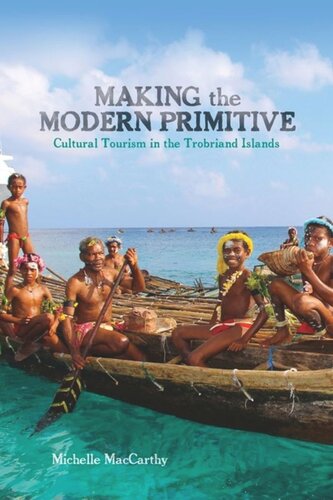

Most ebook files are in PDF format, so you can easily read them using various software such as Foxit Reader or directly on the Google Chrome browser.
Some ebook files are released by publishers in other formats such as .awz, .mobi, .epub, .fb2, etc. You may need to install specific software to read these formats on mobile/PC, such as Calibre.
Please read the tutorial at this link: https://ebookbell.com/faq
We offer FREE conversion to the popular formats you request; however, this may take some time. Therefore, right after payment, please email us, and we will try to provide the service as quickly as possible.
For some exceptional file formats or broken links (if any), please refrain from opening any disputes. Instead, email us first, and we will try to assist within a maximum of 6 hours.
EbookBell Team

0.0
0 reviewsMaking the Modern Primitive provides an anthropological analysis of the encounter between local residents and tourists in the Trobriand Islands, a place renowned in anthropology and represented in various media as "culturally authentic." In such a place, how are ideas about authenticity implicated in creating and representing the self and cultural Others in the context of cultural tourism? Michelle MacCarthy addresses this question by examining four arenas of interaction between Trobriand Islanders and tourists: formal performances, informal village visits, souvenir shopping, and tourist photography. Drawing on both symbolic/interpretive approaches and concepts drawn from economic anthropology, she examines the relationship of tourism to the commoditization of culture, the ways in which local residents actively represent and enact "Trobriandness," and the ways tourists interpret and narrate their experience. MacCarthy offers an anthropological critique of concepts of authenticity, tradition, and cultural commodification, based on long-term fieldwork among Trobriand Islanders and tourists.
These notions, which have particular meanings as analytical concepts in anthropology, are also used and strategically deployed in the discourses of both Trobriand Islanders and tourists. Ideas about primitivity and cultural essentialism, while critiqued by anthropologists, are nonetheless used by both parties in tourism interactions to conceptualize and contextualize difference. MacCarthy demonstrate how such tropes are employed in ways that fit with prevailing metanarratives which each side holds about the other, and how these tropes are reproduced both in individual narratives of both tourists' and Trobrianders' experiences and in their interpretations (often misconstrued) of the lives of cultural Others with whom they interact. She examines the social dimensions of cross-cultural exchange in these four arenas (performance, village life, souvenirs, photography) to argue that cultu